July 24, 2025 - The latest wave of generative AI technologies is accelerating business automation across industries, enabling companies to streamline operations and enhance decision-making. These sophisticated models now produce context-aware text, images, and immersive digital experiences, transforming workflows from customer service to supply chain management. The result is hyper-automation, where AI seamlessly integrates with existing systems to boost efficiency and reduce human error.
According to Dr Emily Carter, AI Research Lead at MilesIT, "Generative AI’s ability to understand nuance and emotion is revolutionising how businesses automate complex tasks, allowing human workers to focus on strategic and creative roles" MilesIT. This shift is underpinned by advances in large language models and neural networks that can generate highly relevant and personalised outputs.
This trend reflects a broader movement towards embedding AI deeply into enterprise infrastructure, with implications for workforce dynamics, cybersecurity, and market competition. As automation expands, companies must navigate ethical considerations around transparency, bias, and the future of work, while regulators increasingly scrutinise AI governance frameworks.
Our view: The rise of generative AI in business automation offers significant productivity gains but also challenges organisations to rethink workforce roles and ethical responsibilities. Embracing these technologies responsibly requires a balanced approach that fosters innovation while safeguarding against unintended consequences such as job displacement and algorithmic bias.

Be the first to comment!